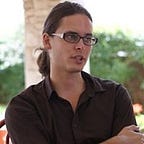Utopias are hyperobjects not perfections
I got this idea over the weekend, when I listened to Tristan Harris describing climate change as a hyperobject, on another great episode of The Jim Rutt Show podcast. Normally we think about utopias as perfections, and this reminds us of various dangerous ideologies and dreams of the last century. But what if we thought about then simply as hyperobjects, that don’t need to be perfect, or in fact have nothing with perfection? This can help us escape the Rousseauan nightmares of children dreaming to be kings and creating havoc all around.
Alexander Bard, a Swedish philosopher, describes the Silk Road, a trading route, as the greatest human project in history. He also talks about a dark Silk Road of the 20th century as it’s opposite. A road that started with Rousseau centuries before, and in the last century continued through Hitler, Stalin, Mao and Pol Pot.
It is only logical that after atomic bomb went off in 1945, we got increasingly enough of utopias and related ideologies. The cultural counter-revolution of 1968, and the moonshot project (of Moon landing) were probably the last time people had some wilder dreams and went off to build communes and communities that build something radical.
After the oil shocks of the 1970's we in the West ended up in what Peter Thiel calls indefinite future. Americans live a positive indefinite future with a transactional mindset where financiers and lawyers rule and people get indebted, because future will be better but we don’t know how it will look. Europeans live in the negative indefinite future. It will get worse but we don’t know how. So we go on vacations and enjoy our past on a continent that increasingly looks like one big tourist attraction. The Chinese live in a negative and definite future. They know what they want to avoid, another Mao’s Cultural Revolution and they save up money for worse times.
What we need is the fourth option of positive and definite future of moonshots. A future where we build definite and ambitious projects that will help us to avoid climate change and bring about prosperity. Not just venture capital investments into software companies and digital tech, but investments into hard tech, such as space industry, circular and regenerative economy. Investments to discover new fields, similar to cellular agriculture — where meat is grown in labs, animals don’t suffer and nature is much less impacted.
To get there, it helps to think of utopias as hyperobjects. Climate change is a hyperobject, meaning a total of all local climate changes, one global climate change. Similarly, you can think about fragility as a hyperobject, a total of all risks and fragilities in the system. Similarly, existential risk is a hyperobject, a sum total of various existential risks that threaten humanity with extinction. For example, nuclear winter after nuclear war would give us two years without sun and without agriculture, where billions could die from starvation.
Nassim Taleb, besides being an internet troll, invented the concept of antifragility. It is not just robustness, it is not just resilience but something more. Jordan Hall explains that resilience is pushing back when you are pushed, and antifragility is inventing aikido on the spot when you are being pushed. Meaning antifragility deals also with information, not just energy.
In the context of anti-fragility, Taleb talks about the opposite of risk or downside, and calls it optionality — maximizing the possible upside. So we have the hyperobject of climate change and this helped us to connect the dots of various natural catastrophes — corral reefs dying, forest fires, stronger hurricanes, etc. The hyperobject of climate change gave us a new conceptual tool to connect those dots and name the problem.
Similarly we need the opposite of dystopias and catastrophic risks as climate change. These utopias don’t need to be perfect, in fact they cannot be perfect. We don’t want to repeat the 20th century.
Alexander Bard talks about three utopias we need. Ecotopia is the utopia of managing climate change and bringing prosperity for ten billion people with the use of technology — sensors, drones, satellites. Ecotopia is seeing the world as a garden to be tendered. So again a hyperobejct. A Hegelian absolute subject, if you want a translation to another language.
The second utopia is Cosmopolis, or the hyperobject of all city states, or charter cities, or just cities and dwellings. The idea of a globalized world where we love the strangers that’s to again digital technologies and AI. Google Translate is a simple glimse of this, imagine something 100x more sophisticated.
The third utopia is a kind of meta-utopia, or better anti-utopia. This is the Barred Absolute, or the idea of abandoning the pursuit of perfection. The idea of replacing progress and progressivism with its belief of better future for our children, with a new paradigm for our internet age and interconnected age of networks. The idea of infinite now, is a paradox of enjoying infinite moments when they last, and then keeping them as memories. If something pleasant would last too long it would turn into something painful. Similarly people need to abandon dreams of living on Mars, the childish dreams of perfection and longevity. We are an emergent property of our ecosystems, of our Earth. And our lives are meaningful, because they are not perfect and they are not infinite.
I think looking at utopias as hyperobjects is important to bring about positive and definite future with very concrete and very ambitious projects, like Ecotopia, like Cosmopolis, while abandoning the childish and destructive dreams of perfection through yet another (anti)utopia of the Barred Absolute. I wrote more on this recently in the context of Game B and the discussion of The Religion of No Religion and why it needs utopian thinking to reach meaning.
